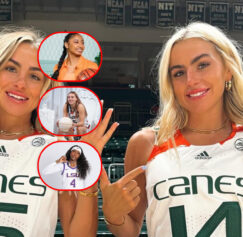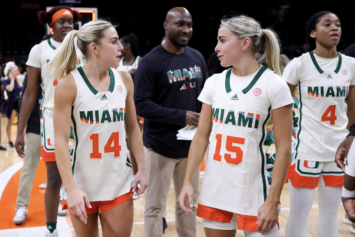The twin collegiate basketball guards known as the Cavinder Twins didn’t need basketball to become famous, but it did help. The former Fresno State standouts turned the overlooked University of Miami women’s basketball team into stars and took the Hurricanes to the Elite Eight last season, something the program had never accomplished. Then, when they had a fifth year of eligibility due to COVID-19, they declined it.
The move shocked many, as the 2022-2023 season birthed heightened focus on the collegiate women’s game, especially after the intense rivalry between LSU champion Angel Reese and Iowa Hawkeyes sharpshooter Caitlin Clark.
However, the twins stepped away from the game to continue growing their influencer businesses and work their NIL deals, making them an example of what it looks like for the NIL generation when they fall out of love with the sport that made them young, rich, and famous.
Twin Talk
“We got in a fight, if you really want to know the tea, and I was like ‘Hanna, I’m going back,’ and she was like, ‘I’m not going back, I’m not doing it anymore,'” Haley Cavinder said on the rebooted “Twin Talk” podcast. “We made it to the Elite Eight, that was Hanna and I’s goal. Hanna didn’t want to play, so she made me quit basketball.”
The twins have millions of followers on social media and are massive TikTok stars. However, while balancing training, playing games, NIL commitments, and more, the balance of the world’s opinions and expectations of them versus self-care eroded their love for a return to the hardwood.
“As a college athlete you miss so much of your family, your life,” Haley continued. “We wanted to just play four years, and we’ve always dreamed of starting our businesses and starting a company and take this route — so it was like, OK, whatever people gotta say, whatever they gotta say, do what you want to do.
“The deciding factor, I went on so many ‘hot girl walks’ and I was like, somebody make this decision for me because it’s giving me so much anxiety.”
Haley was a gem for the Hurricanes, averaging just over 12 points, five rebounds, and just over two assists in her senior season. Her sister, Hanna, performed drastically differently, averaging under four points per game in only 16 minutes of play. Still, the two have raked in over $2 million in NIL deals and are among the top NIL earners in the collegiate landscape.
Hanna Cavinder added that “the burnout” from juggling all the athletic elements affected her and that she wasn’t into basketball “100 percent” anymore.
“I’m not gonna do something that I’m not going to 100 percent of my all to. If I chose to go back that wouldn’t be right, I wouldn’t be fully satisfied at who I am.”
The hate they received for Haley performing better than Hanna or opposing teams being mean on Twitter was another factor for their basketball exodus.
“Everyone’s going to be like, ‘Oh my gosh, you should’ve taken your fifth year,’ but when we were playing basketball, you were hating on us,” Hanna continued.
The Battle of Athletes vs. Sex Symbols
Many of their critics believe they have set an unrealistic standard of what the NIL spectrum can provide post-college since their beautiful and blond aesthetic has been marketed more than their game play. Are they the new normal of what a woman athlete can expect from the NIL era? Probably not, but they understand their “privilege” and blame the world for their good fortune.
“Obviously, everyone brings something different to the table. I think that all women should be empowered in a male-dominant world, especially minorities,” Haley Cavinder told The Free Press.
“I mean, obviously, yes, this is a touchy subject, but I think that we are privileged, in a way,” Hanna Cavinder said. “Obviously, we don’t deal with the same things that other women deal with or other people deal with, and that’s just how our world is, and it’s awful.”
With Angel Reese and LSU gymnast Olivia Dunne making Sports Illustrated’s Swimsuit issue “awful” might be an inaccurate attempt at self-deprecation via societal beauty standards. The reality is that some who don’t have the zeal for sports past college will take their popularity and newfound corporate partnerships into other realms of influence that don’t involve sports, which is OK.


